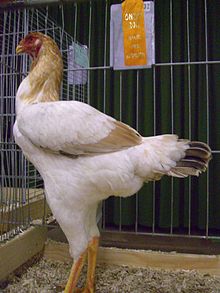Malay Game
 | |
| Conservation status | |
|---|---|
| Other names | Malay |
| Traits | |
| Weight | |
| Classification | |
| APA | all other standard breeds[4] |
| ABA | all other comb clean legged |
| EE | yes[5] |
| PCGB | Asian hard feather[6] |
| |

The Malay Game is a breed of game chicken. It is among the tallest breeds of chicken, and may stand over 90 cm (36 inches) high.[7]: 158
The Malay is bred principally in Europe,[5] and in Australia and the United States.[2] It was derived, partly in Devon and Cornwall in south-west England,[8] from birds imported from the Indian subcontinent[7]: 158 or South-east Asia in the first decades of the nineteenth century, when large birds of this type were widespread in northern India, in Indonesia and in the Malay Peninsula.[9]
The Malay was the first chicken breed to be bantamised; a dwarf version of the standard-sized breed was created at the turn of the twentieth century.[3]: 169
History
[edit]From about 1830 very large game chickens were imported to England, where they became fashionable[9] and were selectively bred by English breeders.[8] Some imports are documented from the Malay Peninsula, others from the Deccan of India.[10] Those from India were sometimes called Grey Chittagongs,[8] but were considered to be closely similar to the Malay. They were particularly numerous in Devon and Cornwall, especially in the area round Falmouth, which was a common first port of call for returning East Indiamen.[10] They were also numerous in Ireland, in the area of Dublin.[10] An early description is that of James Joseph Nolan, published in Dublin in 1850.[11]: 21
Malays were shown at the first British poultry exhibition in 1845, and were included in the Standard of Excellence, the first edition of the British Poultry Standards, in 1865.[3][12]: 19
Malay birds were present in Germany and the Netherlands by about 1834, and by 1846 were introduced to the United States also.[9] The black-breasted red Malay was included in the Standard of Perfection of the American Poultry Association from 1883, and the bantam in 1904; five other colours, both standard- and bantam-sized, were added in 1981.[4] Numbers of the breed in the USA are very low; in 2014 its conservation status there was listed as "critical" by the FAO.[13]
The Malay was the first chicken breed to be bantamised; a dwarf version of the standard-sized breed was created at the turn of the twentieth century.[3]: 169
Characteristics
[edit]The Malay is among the tallest breeds of chicken, and may stand over 90 cm (35 in) high.[7]: 158 The Poultry Club of Great Britain lists five colour varieties – black, black-red, pile, spangled and white – but does not exclude other colours.[3]: 170 The same colours are recognised by the American Poultry Association, with the addition of the wheaten. The Entente Européenne lists sixteen colour variants, of which eight are recognised.[5]
Use
[edit]The Malay is kept mostly for showing.[citation needed] Hens may lay approximately 80 eggs per year; the eggs are brownish or golden, and weigh some 50 g.[14]
The Malay was among the breeds used in the development of the Índio Gigante of Brazil.
References
[edit]- ^ Barbara Rischkowsky, Dafydd Pilling (editors) (2007). List of breeds documented in the Global Databank for Animal Genetic Resources, annex to The State of the World's Animal Genetic Resources for Food and Agriculture. Rome: Commission on Genetic Resources for Food and Agriculture, Food and Agriculture Organization of the United Nations. ISBN 9789251057629. Archived 23 June 2020.
- ^ a b Transboundary breed: Malay Game. Domestic Animal Diversity Information System of the Food and Agriculture Organization of the United Nations. Accessed September 2023.
- ^ a b c d e f Victoria Roberts (2008). British poultry standards: complete specifications and judging points of all standardized breeds and varieties of poultry as compiled by the specialist breed clubs and recognised by the Poultry Club of Great Britain. Oxford: Blackwell. ISBN 9781405156424.
- ^ a b APA Recognized Breeds and Varieties: As of January 1, 2012. American Poultry Association. Archived 4 November 2017.
- ^ a b c Liste des races et variétés homologuée dans les pays EE (28.04.2013). Entente Européenne d’Aviculture et de Cuniculture. Archived 16 June 2013.
- ^ Breed Classification. Poultry Club of Great Britain. Archived 12 June 2018.
- ^ a b c Chris Graham (2006). Choosing and Keeping Chickens. London: Hamlyn. ISBN 9780600614388.
- ^ a b c Chickens. Poultry Club of Great Britain. Archived 9 November 2018.
- ^ a b c Malay Chicken. The Livestock Conservancy. Accessed August 2014.
- ^ a b c William Wingfield, George William Johnson (1853). The Poultry Book: Comprising the Characteristics, Management, Breeding, and Medical Treatment of Poultry. London: W. S. Orr & Company.
- ^ James Joseph Nolan (1850). Ornamental, Aquatic, and Domestic Fowl, and Game Birds: Their Importation, Breeding, Rearing, and General Management. Dublin: The Author.
- ^ William Bernhard Tegetmeier (editor) (1865). The Standard of Excellence in Exhibition Poultry, authorized by the Poultry Club. London: Poultry Club.
- ^ Transboundary breed: Malay Game. Domestic Animal Diversity Information System of the Food and Agriculture Organization of the United Nations. Accessed August 2014.
- ^ Rassetafeln: Hühner (in German). Reichenbach, Haselbachtal: Bund Deutscher Rassegeflügelzüchter. Accessed September 2023.
